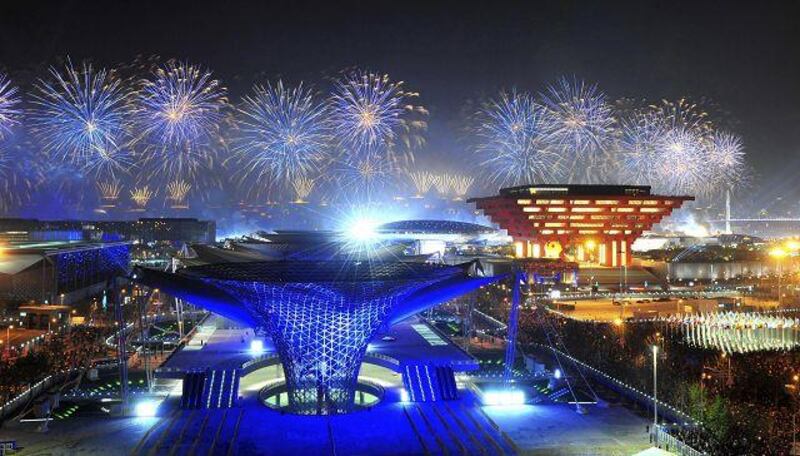SHANGHAI // After just one week you know the world will remember the Shanghai 2010 Expo. China has made sure of it, taking the old concept of the world exhibition fair and giving it the New China treatment.
China likes large set pieces such as the Expo and does them better than any other country in the world, as the Olympics nearly two years ago showed. The Expo was visited by more than 500,000 in its first three days. Queues waited for as long as three hours as temperatures rose to 30°C. Over the six months the show runs, it can expect at least 70 million visitors, overwhelmingly from China, and another Olympic-style platform to show off the country's remarkable economic rise.
Attendances have fallen shy of expectations, largely for logistical reasons, but given China's long record in stage managing, and the importance attached to the event by the Communist Party, that final turnout estimate is assured. City authorities expect Shanghai's GDP to grow by about 6.5 percentage points as a result of the event, and they say the main goal for holding it was to push forward the process of urbanisation.
All of this razzamatazz comes at a cost. The official version has it that China spent US$4.2 billion (Dh15.42bn) - double the outlay for the Beijing Olympics - to host the Expo. Local media outlets report that once you factor in infrastructure and other measures to modernise and upgrade China's financial centre, the country has spent $58bn. The World's Fair is a concept that had its heyday in the giddy, expansionary years of the late 19th century when it gave us the Eiffel Tower and the Crystal Palace in London, and it also flourished in the progress-obsessed years of the 1950s.
But since then the Expo has flagged somewhat. Hanover in Germany and Aichi in Japan held successful expos, in 2000 and 2005 respectively, but they were not terribly memorable. Shanghai World Expo will be because China wants it to stay in the memory long after the pavilions have been boxed up and shipped off to their host countries, or simply discarded. Expo is not about permanence. China has a long association with Expo. A Qing dynasty businessman, Xu Rongcun, showed silk at the first World Expo in London in 1851 and won a prize for China.
The People's Republic of China exhibited some terracotta warriors from Xi'an and bricks from the Great Wall of China at its debut Expo outing in Tennessee in 1982, and in 1993 China was admitted as the 46th member country of the Bureau of International Exhibitions (BIE), the group that runs the Expo. According to the latest statistics from the organisers, the event features 189 countries and 57 international organisations in the largest-ever expo.
China is proving remarkably clever at exploiting the business potential of these large international events. Under the terms of the 4 trillion yuan (Dh2.15tn) fiscal stimulus plan, much investment went into upgrading the city. The Expo provided a perfect opportunity to frame the spending in a meaningful way. Officials spent about 306bn yuan on infrastructure, creating the world's longest metro system and two airport terminals, radically refitting the historic Bund waterfront and building an intricate web of new roads, parks and bridges across the city.
In the run-up to the Hanover Expo, the headlines were obsessed with the cost of the event and a very negative atmosphere developed around the Expo, which was seen as a waste of time and money. There is no question of that happening in China. The headlines from a press that is somewhat less than free are all overwhelmingly positive, focusing on the benefits the Expo will bring to China and the world, and making sure that no one forgets that it was the world's fastest-growing major economy that hosted the World Expo in 2010.
business@thenational.ae





